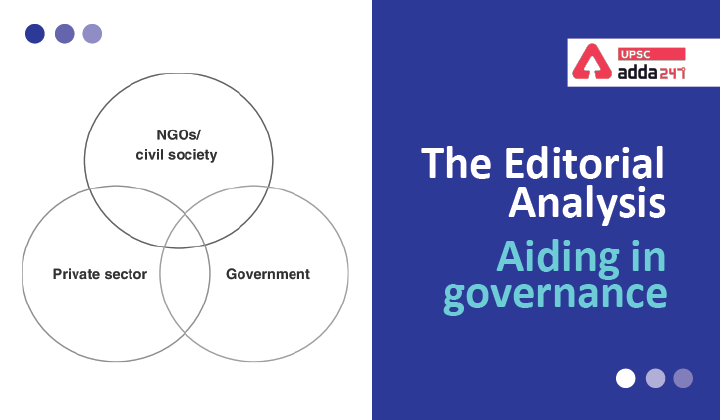Table of Contents
Aiding in governance: Relevance
- GS 2: Development processes and the development industry —the role of NGOs, SHGs, various groups and associations, donors, charities, institutional and other stakeholders.
Aiding in governance: Key points
- A collaborative effort among government, market and non-state informal institutions leads to development of a country.
- CSR: Companies Act mandates corporates who are beyond a certain level of profits and turnover to pay at least 2% of their net profits before tax to the development space. It necessitates the private sector to collaborate with non-state actors like Non-Governmental Organisations (NGOs) and Civil Society Organisations (CSOs) to undertake developmental efforts.
Governance in India: Benefits of NGOs
- Non-state actors like NGOs strengthens the citizenry-private partnerships.
- Non-state actors, because of their depth of engagement with communities, bring patient capital to corporate board rooms and help the state, too, by engaging in welfare activities.
- NGOs and voluntary groups/organisations have played a significant role in building capacities of citizens to hold governments accountable.
- They become the vehicle to carry the demands of people to formal institutions. For example, RTI Act was enacted due to the efforts of NGOs.
- NGOs acts as a bridge between people and firms/state. They help in executing various flagship projects and hence bring development to the local level.
- NGOs and CSOs sometimes do the heavy lift and ensure that schemes reach the last person even in the face of disaster. When non-state actors take a large load off the state’s shoulder, the state can focus more on governance.
- Research shows that the synergy of NGOs, Government and corporates is the holy grail of development.
Also Read:




 TSPSC Group 1 Question Paper 2024, Downl...
TSPSC Group 1 Question Paper 2024, Downl...
 TSPSC Group 1 Answer key 2024 Out, Downl...
TSPSC Group 1 Answer key 2024 Out, Downl...
 UPSC Prelims 2024 Question Paper, Downlo...
UPSC Prelims 2024 Question Paper, Downlo...





